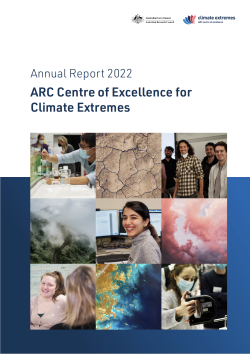
The Centre of Excellence has a long-term strategy to support an uplift in the understanding within the finance sector of climate risk.
In this context, “finance sector” includes regulators, banks, Treasury (federal and state) reinsurers and insurers. However, as recognition of climate risk and business grows, and as regulators encourage business to consider climate risk, the breadth of interested organisations grows.
The Centre’s engagement in this area has been led by Professor Andy Pitman, supported by several Chief Investigators, including Professor Christian Jakob, Associate Professor Gab Abramowitz and Associate Professor Sarah Perkins-Kirkpatrick. Strong collaboration with colleagues at the University of Sydney, in particular Dr Tanya Fiedler, has been instrumental.
To build a profile and support our engagement in this area, two academic papers with very high impact have been published:
- Fiedler, T., Pitman, A.J., Mackenzie, K., Wood, N., Jakob, C., and Perkins-Kirkpatrick, S.E., 2021. Business risk and the emergence of climate analytics. Nature Climate Change, 11, 87–94, doi: https://doi.org/10.1038/s41558-020-00984-6
- Pitman, A.J., Fiedler, T., Ranger, N., Jakob, C., Ridder, N., Perkins-Kirkpatrick, S.E., Wood, N., and Abramowitz, G., 2022. Acute climate risks in the financial system: examining the utility of climate model projections. Environmental Research: Climate, https://doi.org/10.1088/2752-5295/ac856f
The first of these papers has already been cited 76 times and downloaded over 9,000 times. It is in the 99th percentile of tracked articles of a similar age in all journals (Altmetric). The second paper was downloaded over 2,000 times in the first 30 days following publication.
More importantly, in the context of engaging with regulators, these papers have been central in briefings with the US Securities Exchange Commission, the Australian Prudential Regulation Authority, the US Federal Reserve, the Monetary Authority of Singapore, UBS and many others. A growing Linkedin profile has helped us communicate this work directly to business. We included our perspective on financial risk in tweets and Linkedin posts associated with the 27th Conference of the Parties (COP27).
Our approach to helping communicate climate risk to the financial sector has received widespread coverage, including in the Sydney Morning Herald and The Australian.
Our work has also been picked up by industry blogs, and formed the basis of industry briefings (including by Yale), the Governance Institute of Australia and many more.
An emerging strategy to become a contributor to “thought leadership” across industry is particularly important, as business will tend to listen to those within the sector rather than academics. Our initial engagement here has included the following report:
- Wood, N., Pui, A., Pitman, A.J., Evans, J., Aellen, N., Auestad, H., 2022. Treating Climate Uncertainties as Knowable Risks – a Recipe for Greenwash? Joint report by Energetics, Swiss Re and ARC Centre of Excellence for Climate Extremes, https://www.energetics.com.au/insights/thought-leadership/experts-warn-current-approaches-to-assessing-physical-climate-impacts-are-flawed.
Supporting a general uplift is one thing, but actually changing how climate risk is managed by business is different, given pressures from regulators, investors and so on. It is far easier for a business to undertake a superficial or misleading risk assessment that satisfies the regulators, than to invest in a proper assessment. In short, the Centre’s role here is ongoing.
ARC Centre of Excellence for Climate Extremes – Annual Report 2023
From the Chair of the Advisory Board
Climate Science Leaders of the Future
Weather and Climate Interactions Research Program
Attribution and Risk Research Program
Ocean Extremes Research Program
Computational Modelling Systems
Governance, Management and our Commitment to Equity, Diversity and Inclusion

